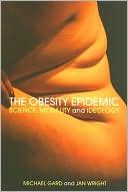The Obesity Epidemic: Science, Morality and Ideology
Search in google:
The Obesity Epidemic adds a much-needed voice of skepticism to the increasingly alarmist debate about weight and health. Gard and Wright show that "obesity" is above all a deeply problematic cultural and political concept, making clear that the social meaning of fat is determined largely by moral and ideological agendas -- agendas that are all the more powerful because they cloak themselves in the mantle of objective science and public health. Indeed, this book demonstrates how and why concepts such as "science" and "health" are themselves far more problematic than those who invoke them like to admit. THE OBESITY EPIDEMIC is a superb contribution to the sociology of knowledge, and an essential text for anyone who wants to understand the current moral panic over fat. Doody Review Services Reviewer:Patrick E McBride, MD, MPH(University of Wisconsin School of Medicine and Public Health)Description:This treatise questions the existence of the current "obesity epidemic" and challenges the current theories regarding human obesity. The implications of the moral and ideological issues surrounding obesity and the public policy response to the increasing prevalence of obesity make up the majority of this book.Purpose:The premise of the book is that obesity is a complex issue and that the usual simplistic argument that obesity is due to eating too much and exercising too little has significant ethical and public health implications, and thus the discussion of the increase in obesity should involve more than science - it should extend to morals and ideology as well.Audience:The book is written for any individual interested in the scientific and public policy issues of health and obesity, including scientists, teachers, health professionals, and policy makers.Features:The authors spend considerable space reviewing the scientific literature to ask the question: Is it possible to present clear recommendations on how to reduce obesity if the causes are not known? The authors emphasize the uncertainty that exists in the literature on the causes of obesity and the lack of effective treatments. How this belief that obesity is simply too many calories and not enough physical activity translates to popular media, and is used morally and ideologically to attempt to change behavior in families, societies, and culture, is questioned. The authors argue that if obesity in children and adults is thought to be primarily due to overeating and lack of activity, the implication is that the overweight or obese person is guilty of gluttony and sloth. That judgment has profound implications on the individuals and society. People are told what to buy, what to eat, what to watch, how to live, and more in their everyday lives, and the authors state that this information is not based completely on science. Critical points are raised about the importance about not "blaming the victim" and the social effects of obesity. Assessment:This book makes an important contribution to the obesity debate, but it is a controversial book that should not be seen as the definitive answer to that debate. A significant difficulty in supporting the authors' premise is that it is impossible to refute the statistics on the increasing rates of overweight and obesity in children, adolescents, and adults in many regions of the world. The authors often selectively choose to cite research or parts of research that fit their argument and are so critical of opposing papers or key research as to not see the big picture -- that there is a marked increase in overweight and obesity in many parts of the world, that people eat more in most countries that have weight gains, and a population health approach is needed to address this problem. Nevertheless, the authors argue, and rightly so, that we have to go beyond the human body to address obesity, into the fields of social science, economics, public policy, etc., and they challenge scientists that we may not be ready for that complex a task. The other choice the authors propose is to just "get over" body weight, which they admit is not likely to happen in the scientific community. In the end, there are good points to take from this book, calling for care and caution on how we approach the science of this important public health issue, but better scientific methods would have helped this book, too.
1Science and fatness12The war on obesity163The ghost of a machine374'Modernity's scourge' : a brief history of obesity science685Fat or fiction : weighing the 'obesity epidemic'866The search for a cause1077Obesity science for the people1268Feminism and the 'obesity epidemic'1539Interrogating expert knowledge : risk and the ethics of body weight16810Beyond body weight187








